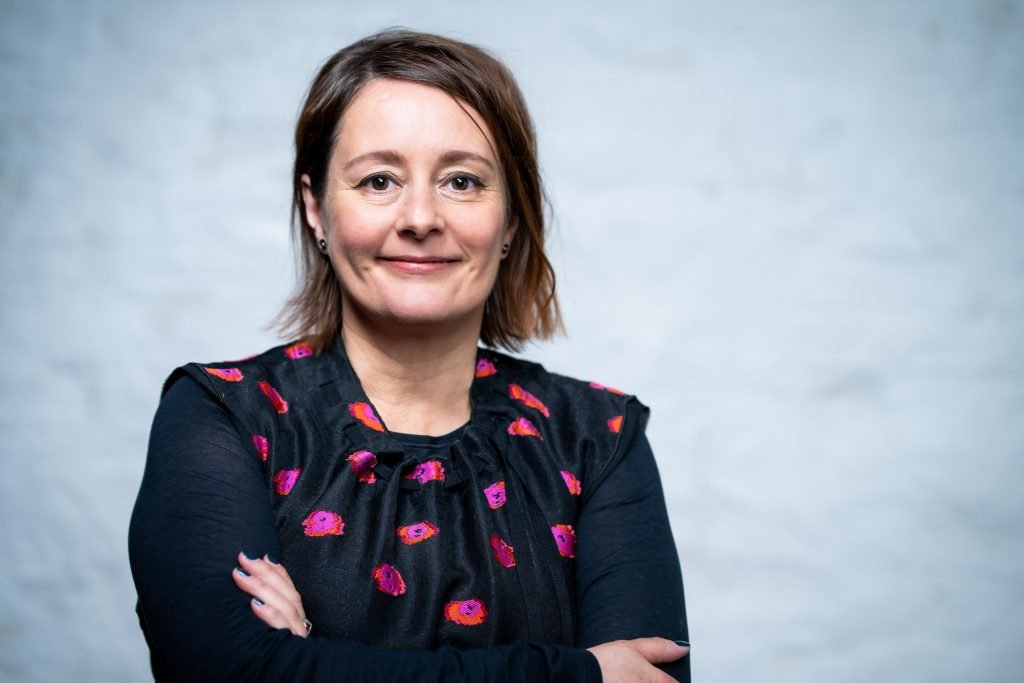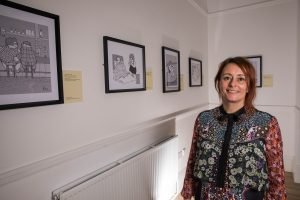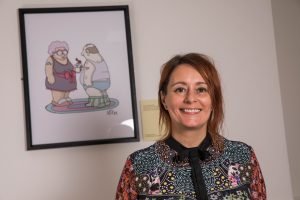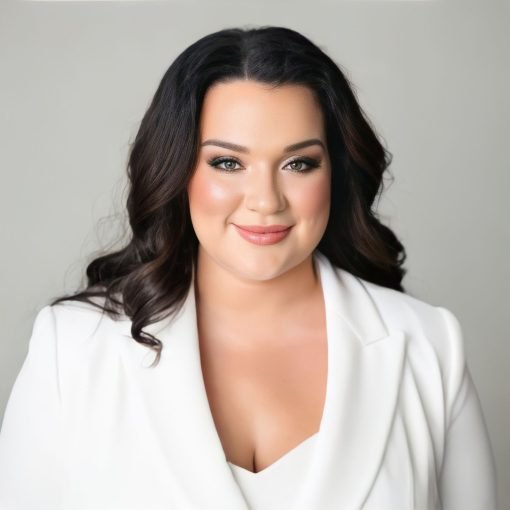
Dr Sharron Hinchliff, Reader in Psychology and Health at the Division of Nursing and Midwifery, Sheffield University, leads the ageing, gender, and sexual health/sexual well-being programme of research at the University. She has worked in this area for over 20 years and uses insights from psychology to address inequalities and the problem of discrimination in healthcare and wider society.
Key to Sharron’s work is innovation and resource development, including the Age of Love project which uses art and light humour to raise awareness of the intimate relationships of older adults, and the public health website agesexandyou.com which provides information for people aged 50 and older about the sexual changes they might face, for use by health professionals and older adults themselves. Dr Hinchliff co-edited the book ‘Addressing the sexual rights of older people: Theory, policy and practice’, and in 2022 launched the UK’s first Sexual Rights Charter for Older adults in partnership with Age-friendly Sheffield.
Congratulations on the UK’s first Sexual Rights Charter for older adults; how is it going, and how was it received?
Thank you! It’s going really well. We launched the Sexual Rights Charter in 2022 with the aim to support open and honest conversations about sexuality as we age. We know from our research that people in midlife and older face barriers to seeking help for sexual issues, and that health and social care staff experience obstacles to providing that support, so we decided to do something about it. The Charter not only raises awareness of the key issues, but it also provides guidance for services to be age-friendly and sexual rights savvy.
 Sexuality includes our sexual thoughts, feelings, behaviours, and identity, and is important to many people as they get older. But this is not always recognised and one of the main reasons is because as a society we tend to associate sexual expression and activity with younger people which has a huge impact on the services we provide. So the Charter helps to tackle social stereotypes associated with older age, such as the sexlessness stereotype and the assumption of heterosexuality.
Sexuality includes our sexual thoughts, feelings, behaviours, and identity, and is important to many people as they get older. But this is not always recognised and one of the main reasons is because as a society we tend to associate sexual expression and activity with younger people which has a huge impact on the services we provide. So the Charter helps to tackle social stereotypes associated with older age, such as the sexlessness stereotype and the assumption of heterosexuality.
Key to Sharron’s work is innovation and resource development, including the Age of Love project which uses art and light humour to raise awareness of the intimate relationships of older adults, and the public health website agesexandyou.com which provides information for people aged 50 and older about the sexual changes they might face, for use by health professionals and older adults themselves. Dr Hinchliff co-edited the book ‘Addressing the sexual rights of older people: Theory, policy and practice’, and in 2022 launched the UK’s first Sexual Rights Charter for Older adults in partnership with Age-friendly Sheffield.The Charter is currently being used by community groups (e.g. for wellbeing cafes and book clubs), and it forms the basis of training that has been commissioned by health and social care providers. It was important to us that the Charter was inclusive, so when we were developing it we consulted with diverse communities. We worked in partnership with Age-friendly Sheffield, with the main objective to make a difference in the lives of people as they age by recognising sexual agency, respecting diversity, and tackling ageism.
Please share with us your early life experiences and how this impacted your career journey
I grew up in South Yorkshire in a working-class family. My mum had a few jobs that fitted around raising a family: school dinner lady, barmaid (as they were called back then), and she also worked at my aunt’s sewing factory. My dad was a joiner. We’re from a coal mining family but Dad didn’t go to work down the pit mainly because he had a skill for carpentry, and because family members had seen first-hand what a dangerous job coal mining was so they steered him away from that.
Our family was small but I did grow up surrounded by strong women. I left school at age 16 and went to work on a Youth Training Scheme and then in a sewing factory, again surrounded by strong working-class women. This cemented my interest in women’s health and wellbeing, and my determination to tackle gender inequalities and make things better for women. I went to University in my 20s after taking an Access to Higher Education course to get the qualifications needed because I left school with only one O’level and that was in woodwork!
My mum and dad instilled a strong work ethic in me and a fierce determination, both of which were an advantage when I was studying for my PhD. The values that I learned from the people I grew up with have been a guiding light, personally and professionally, enabling me to establish a career as an academic. As a first-generation academic I didn’t have any academic role models when I was growing up, but I did have role models who inspired me to work hard, persevere, and keep my feet on the ground.
What have been your proudest moment?
I was proud to be awarded my PhD because that was the culmination of my journey, from leaving work, going to night school, then to college, then to university. I never thought I would get that far. But with the support of people who gave me a chance (such as the guy who interviewed me for college, the team who awarded me a PhD study scholarship, my doctoral supervisors) and those who helped me emotionally (friends and family), I did.
I’m also very proud to be a mum. My kids are young adults now, forging their own journeys, so they need me less. They are good people and that makes me happy. Plus, it’s such a pleasure to spend time with them.

What’s the biggest challenge you faced in your career, and how did you overcome it?
This is a great question. It takes time and a lot of work to establish yourself as an academic, and we know that can be doubly hard for women and those from non-traditional academic backgrounds. Academia has a culture of overwork, so trying to balance that has been a challenge. Having young kids helped because you simply cannot work all the hours when you’re raising a family. And I wanted to watch them grow-up because I knew I would never get that time back. I made a conscious decision early on to maintain a work-life balance so that I could be with my kids in the morning and at night, take them to school, bathe them, and read a bedtime story. It wasn’t easy but I was fortunate to have the support of my partner and our parents, so it was a team effort.
I’ve also been fortunate to meet and work with some colleagues who have given me opportunities and pushed me to learn and develop in ways that I may never have. And I try to pay that back. My work in supporting women to achieve their goals was recognised in 2022 when I won the She Inspires ‘Girl Up’ (national) Award. It was such a privilege. You know, the relationships we have with others, within and outside of academia, can help you to overcome work-related challenges.
What is the inspiration behind the Age of Love project?
Love is such a powerful force. Our Age of Love exhibition consists of 12 images, each with a short narrative, that tell the story of an older couple who are dealing with a sexual difficulty. The couple, Frank and Joy, are very much in love and sex is important to them. The idea was based on findings from our research that shows that the older we get the more difficult it is to get help for a sexual issue.
I worked with artist Pete McKee who brought my research findings to life with artwork that used light humour so people could engage with this sensitive topic without the embarrassment. His artistic style is one that people identify with. Pete’s work has a theme of strong women and he made sure that Joy was in the driving seat for the Age of Love narrative.
We’ve exhibited twice in Sheffield and received thousands of visitors, some travelling from afar. Watching them as they laughed, cried, and hugged their partner was a joy and I saw first-hand the value of taking my research to people who may not otherwise hear about it. The aim of the exhibition was to start a conversation that matters, on a topic we don’t often hear about, and we certainly achieved that.
What are some of the complexities in the sexual rights of older people?
There are two key areas here. First, when older age intersects with other categories of identity such as gender, race, disability, social class, it can mean that people experience multiple layers of inequality. So for me, the complexities come to light when we think about the Equality Act and its protected characteristics.
Second, not everyone recognises that sexual rights apply to older adults. Sexual rights are human rights as applied to sexuality, so we all have them. But traditionally sexual rights have been considered in relation to younger people to protect them from HIV and sexually transmitted infections, abuse and violence, and unintended pregnancies. It’s important to continue advocating for sexual rights as a life-course issue so that awareness and action extends further than the health and social care contexts and into wider society.
How do sexual rights or lack thereof impact our overall well-being
Any form of discrimination can affect our health and well-being. And I would argue that when our sexual rights are not being met, that is a form of discrimination. We know that sexual activity can have benefits for our health and well-being, such as the boost to self-esteem from feeling desired, lower levels of depression, better tolerance to pain, better sleep quality and so on. Being able to be our true selves, so our sexual identity has benefits for health as well. Denying people their sexual agency, expression, and freedom to be themselves is damaging to our health, well-being, and society overall
What is the biggest challenge surrounding women’s reproductive health, and how can we collectively work towards eliminating it?
There are a few challenges to choose from here, unfortunately. But as we’re talking about midlife and beyond, I will pick the menopausal transition. There is a lot going on about menopause at the moment in the UK so women are learning more about the symptoms and how to manage them, and practitioners are receiving training to support patients. But we need to make sure that the progress we make is inclusive. Women are a diverse bunch, and there are communities that are under-represented in the menopause world. And we need to ensure that trans men and non-binary individuals are not left behind. Gender inequality infiltrates all aspects of health care. There is no one-size-fits-all here.
What’s next for you
I’m currently working with a fantastic team at the Faculty of Sexual and Reproductive Health to develop specialist menopause and sexual well-being training for health professionals. On the community side of things, I am working with a superb local organisation, Heeley Trust, to deliver Age of Love cafes; these are menopause cafes with a twist. The twist is that we focus on sexuality and reproductive health, with the aim to support well-being.






